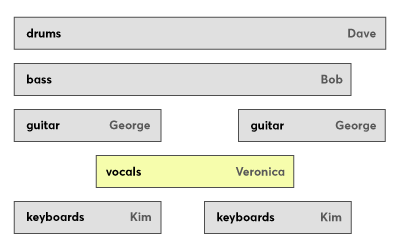Blockchains for metadata and licensing
*Note: this article remains published for historical purposes. This post explains our current position on blockchain tech.
In this post, we’ll explore another emerging trend – using the blockchain for managing and automating music metadata and licensing.
Very briefly, the blockchain is the technology framework that powers Bitcoin, which is a digital currency that operates without a central bank. To begin to grasp the potential it holds, let’s compare it to virtually everything else that exists online.
By example, this website sits on a specific server in a specific room. For all the hype about “the cloud” it’s all the same thing… databases of content stored on specific machines in specific rooms in specific buildings. A blockchain database by contrast exists everywhere… everyone that uses it, has it, making it a highly unique form of data management.
Being decentralized and distributed across the entire network, a blockchain-based system for music distribution could therefore solve many of the industry’s fundamental problems, everything from inconsistent credits to more effective payment distribution.
Some common problems in the music world
First, let’s start with performance and songwriter credits.
Song credits are often managed by a wide variety of agencies, organizations and companies who all store records in separate databases, making it hard to track down consistent information about exactly who did what on a recording.
It gets worse.
Briefly scroll up to the photo of that stack of records. Then imagine trying to find out not only who deserves the credit, but who also has the rights to every one of the songs on those albums. Sound daunting?
So we have credits and we have rights, often managed and tracked by numerous institutions using totally different data storage methods. Having all of that data instantly accessible in a decentralized and distributed database could solve the credits and rights problems we’ve described.
Now let’s look at licensing
Whether for live, streaming, or sync rights (commercials, film and television), keeping track of who is in charge of particular rights can be an extremely time consuming process for music supervisors, startups, venues and other services.
For music supervisors, tracking down who has permission for using songs in film + commercials can take months before negotiations ever begin. For venues required by PROs to pay licensing fees, frustration over not knowing whether the money paid directly correlates to what was played. For startups and other services, a combination of the above concerns compounded by sheer volume.
By one specific example, Chris Castle pointed out there are thousands (or more likely tens of thousands) of artists who have music on Spotify that was placed there without their knowledge. Those artists likely sent their work to an aggregator like TuneCore to get into iTunes, unaware of some minor point in their terms and conditions that would allow them to place that content elsewhere. (I know this firsthand, having discovered an album of mine that I never sent to the streaming service.)
How could this be improved with the blockchain?
Quite simply.
Imagine for a moment that music files were connected to a smart contract that could run 24/7 sending out automated licensing, usage and payment agreements to hundreds of parties around the world:
- allowing for direct purchase
- offering licenses for streaming and downloading apps
- authorizing sync rights for usage in film and television shows
All without phone calls, emails or face-to-face contract signing.
And that is just the beginning of what is possible with blockchain technology.
It gets even better
For artists, producers, DJs and remixers, we get a whole other set of benefits. Let’s start with a typical sequence in a DAW (digital audio workstation) for a rather basic track:

We see five players listed, sequenced in different sections of the song.
Imagine that Veronica says you can sell the full song to a film or TV show, but for commercials, she doesn’t want her vocal being used. Easy. What if a DJ wants to lift the keyboard out for a new mix? Simple. What if a teenager wants to use the song in her YouTube video, but thinks the drums are too noisy and should be dropped out?
In all scenarios, if the band built these rules into the blockchain, they could issue licenses and deliver stems 24/7 without ever having to negotiate a single deal. Maybe they feel exactly the opposite in some cases… maybe they’re undecided about whether a specific song should be used and actually prefer to be contacted if someone wants to use their work? Easy to build in that scenario as well.
Then think about the engineers, producers and mastering specialists who have been typically unaccounted for in these situations and it becomes easy to imagine that everyone involved could finally be effortlessly compensated for their role in the creation of a particular piece of music.
The possibilities are limited only by imagination.
Our mission
Resonate is committed to advancing tools and technologies that will support and sustain the careers of countless independent songwriters, performers, producers and everyone else involved in the creation process.
We’re collaborating with numerous individuals and organizations aiming to bring this kind of system to life.
Together we can transition into truly efficient systems that finally bring fair trade practices into the music world.
** **
Further reading/resources
Bruce Pon of Ascribe has a great primer on why the blockchain changes everything.
Dan Tapscott has a nice broad overview (with helpful illustrations):
Listen to Vinay Gupta explain the difference between current technology and where this is going to take us: